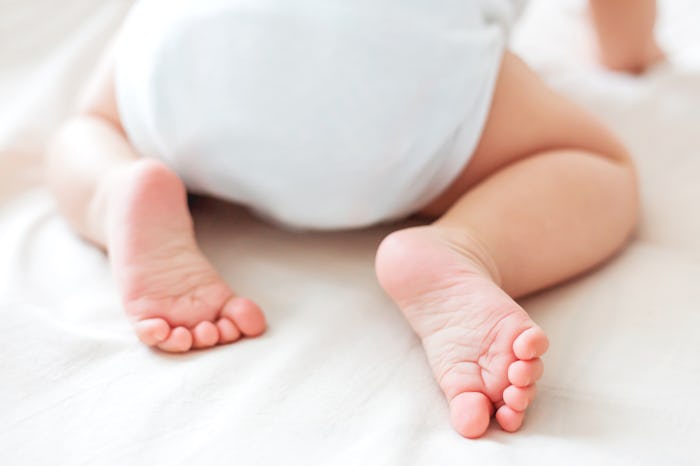Life

There's A Reason Why Your Baby's Feet May Reek A Little Of Vinegar (Ew)
I vividly remember the first time I realized my infant son had sweaty feet and how they subsequently turned a little smelly. My sweet baby who was supposed to smell only like perfect magical newborn baby, was actually a bit stinky and... vinegar-scented. It's not exactly the smell you hope to get from your precious bundle of joy's perfect feet, but luckily there's a reason why baby feet smell like vinegar. (Thank goodness, because that is not a pleasant scent.)
Baby feet smell like vinegar because babies and children are sweatier than adults, according to Dr. Cindy Gellner, in conversation with University of Utah Health radio. "Kid's feet sweat more than adult's feet sweat. Increased sweat means increased bacteria, means increased odor," she explained, and the same goes for babies, unfortunately. She suggested trying to keep your kid's feet as dry as possible throughout the day to help keep the smell at bay. "Make sure your child has clean feet, changes their socks when they're sweaty, and wears breathable shoes if possible."
Of course, part of the problem with infants is that you're often trying to keep them warm and cozy since they can't regulate their own body temperature yet. But if you are unintentionally overheating your baby and making her sweat in multiple layers, stinky feet could be a byproduct. Dr. David Geller wrote on BabyCenter, "Since feet are frequently wrapped up in shoes and socks and 'breathe' very little, they tend to sweat the most and smell the worst."
If that rings a bell for your baby, there are a few things you can do to ensure the stink goes away. First, let those baby feet air out as much as possible and follow some of Dr. Geller's recommended tips. First, "leave her feet naked or have her put on clean, dry socks," and "bathe her feet daily to remove any dirt or old skin."
You'll also want to ensure that your baby is wearing socks made from natural fibers, like cotton or wool. Livestrong pointed out, "The majority of baby socks on the market are at least partially made from man-made materials; these fibers allow the manufacturer to make soft, stretchy socks at a low price." But those synthetic materials can be significantly less breathable for your baby's sweaty and warm feet.
If you need a little more ammunition against those smelly baby feet, you can use a little baby powder to dry up the sweat. However, keep in mind that baby powder can be very dangerous for babies to inhale it. The Italian Journal of Pediatrics reported, "The use of talcum powder is incorrectly part of the traditional care of infants. Its acute aspiration is a very dangerous condition in childhood and several fatalities have been reported." The biggest danger in using baby powder is actually in leaving it where a baby can get into it himself and inhale a large amount. If you do use baby powder on your baby's feet, make sure to put it away somewhere out of reach afterward.
Another option for clearing up your baby's stinky feet problem is to wash their shoes and socks often. Dr. Geller recommended that you "wash her shoes, which can harbor odors, dirt, fungus, or bacteria that contribute to your child's stinky feet." In fact, if you're reticent to use baby powder directly on your baby's feet, you can sprinkle a little into their shoes instead, said Dr. Geller, and that should cut down on any potential inhalation.
Whatever you do or don't do, know that you aren't alone in having a baby with stinky feet. The Institute for Preventative Foot Health reported that 16 percent of adults have foot odor, so perhaps you can just get a jump start on figuring out what can quell the stench at an early age.